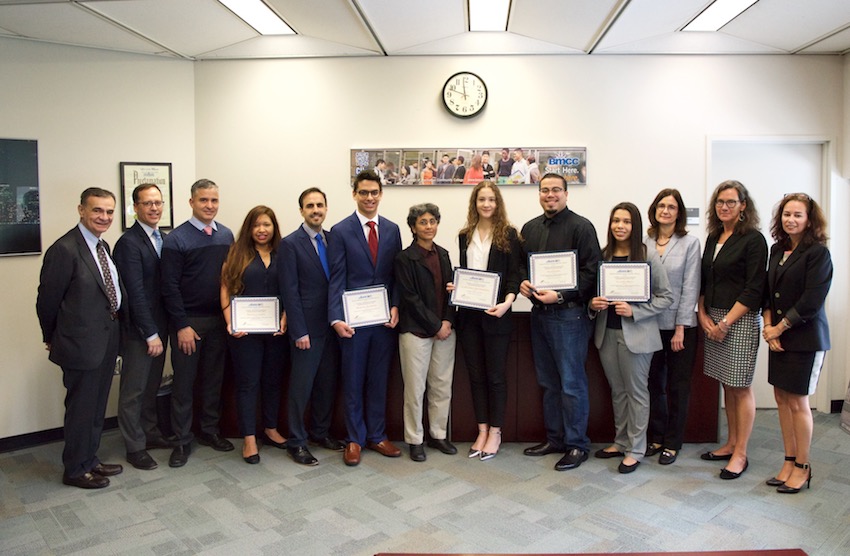
On May 9, the 2018 Borough of Manhattan Community College (BMCC/CUNY) Annual Research Symposium (BARS) presented a poster session that highlighted the research projects of 92 students working with 39 faculty mentors in a wide variety of fields.
Guided by their professors, the students have been examining kinetic recycling, robotic navigation, virtual reality, graph theory, the bioactivity of medicinal plants, solar panels, human memory and a number of other topics.
“The 2018 poster presentations showcase the unique undergraduate research opportunities at BMCC, made possible by the dedication and academic excellence of our faculty, as well as the talent and commitment of our students,” said Karrin E. Wilks, Provost and Senior Vice President of Academic Affairs.
She said she is not only impressed with the caliber and significant outcomes of the projects, “They expand and develop the students’ education and career preparation, and contribute to a rich and thriving research community at BMCC.”
Poster winners
As is the tradition with poster sessions, a competition determined which ones met the highest standards. They were judged by 44 volunteers; staff and faculty members who followed a rubric focused on the quality of communication and other elements.
“The poster event and competition is an illustration of students connecting to academics, faculty and the BMCC campus, which are the most promising ways to keep students engaged and on track to graduation,” said Sara Crosby, Director of the BMCC Learning Academy and a volunteer poster judge.
“I left the event feeling very proud of BMCC students, faculty, and staff,” she says, “and with my brain full of magnetic catalysts, wobble bots, protein distance maps and reiki’s effect on C. elegans!”
The winning students, along with the names of their projects and faculty mentors are:
Claudia Melo and Victor Cruz, “Antioxidant capacity of guava: A traditional medicinal plant used in the Dominican Republic (psidium guajava),” Professor Adolfina Koroch, Science;
Alexandra Artyfikiewicz, “Composting: A benefit or a cost for BMCC,” Professor Christine Farias, Social Sciences, Human Services and Criminal Justice;
Brenda Lagares and Reese Long, “Combination of griffithsin and broadly neutralizing antibodies results in antiviral synergy against HIV-1,” Professor José Fernández Romero, Science;
Amanda McKenzie, “How does attention affect the richness of our visual experience?” Professor Marjan Persuh, Social Sciences, Human Services and Criminal Justice;
Marawan Elzoeiry, “Adsorbate induced-segregation effects in three different mixed oxides: A computer-based study,” Professor Daniel Torres, Science.
Publically relevant, high-impact work
On May 23 in a conference room at 199 Chambers Street, a ceremony was held to honor the research poster winners.
The students and their faculty mentors came together, along with BMCC President Antonio Pérez, Dean Jim Berg, Provost Karrin Wilks and Director of Research Helene Bach.
Each student winner received a certificate of recognition and an award of $500 from the BMCC Office of Academic Affairs toward travel expenses to present their posters at a national research conference in the coming academic year.
Research projects at BMCC afford students with a unique opportunity to gain hands-on understanding of some of the most compelling research questions and issues under consideration today.
For example, said Professor Romero, in the project he leads with students Brenda Lagares and Reese Longare, “The TZM-bl or HeLa cells we used in our experiments are part of the legacy of Henrietta Lacks,” an African-American woman whose cancer cells were harvested without her knowledge when she died in 1951, and are the source of one of the most important cell lines in medical research today.
The HeLa cells in his project, which are provided free of charge through the National Institutes of Health AIDS Reagent Program, have been genetically engineered to become susceptible to HIV infection. “They are used to evaluate the potential antiviral synergy of a protein isolated from red seaweed, in combination with broadly neutralizing anti-HIV antibodies,” Romero says.
In other words, they are being used to contribute to the knowledge base that is enabling possible HIV treatments.
“You are all doing high caliber, graduate-level work here at BMCC,” Director Bach told the student researchers.
They are able to describe their work to PhDs and other researchers in their field, she said, as well as bring publically relevant, high-impact issues to the attention of the general public.
“Your research is not only technically difficult,” Bach said, “it warrants having a presence outside the laboratory, so that people are aware of its influence on the economy, public health, the environment and other vital areas.”
Research opportunities at BMCC
At BMCC, students benefit from multiple research opportunities housed in departments as varied as the Center for Ethnic studies, Health Education, Modern Languages, Science and Business.
These opportunities often provide stipends for student researchers who work closely with their professors who are principal investigators on state- and federally funded grants provided through the BMCC Foundation Fund for Undergraduate Research, the Louis Stokes Allied Minority Participation (LSAMP), the CUNY Research Scholars Program (CRSP) and others.
Resources for faculty researchers include the BMCC Office of Research and Scholarly Inquiry, which provides training and support for faculty and student researchers. For more information, call (212) 220-8320, Ext. 7980.
Another resource is the BMCC Office of Sponsored Programs, which offers a wide range of resources to faculty and staff as they search for external funding, develop proposals and manage funded projects. For more information, call (212) 220-8010.
STORY HIGHLIGHTS
- The 2018 BMCC Annual Research Symposium (BARS) on May 9 highlighted the research projects of more than 90 students working with 39 faculty mentors
- On May 23, seven student researchers were recognized for their outstanding research posters
- They received a certificate and $500 from the Office of Academic Affairs toward travel to present at a national conference

